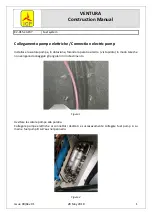
Only sail out as far as you are able to swim back.
Thoroughly check the kite-spot for shallows, obstacles, currents etc.
Keep two line-length of distance between yourself and other beach users,
obstacles, etc. Never fly the kite above other people downwind of you.
Make sure that you are being watched while you are kite surfing and someone
can call for help in an emergency.
Only use the kite if you are in a good physical condition and never under
the influence of drugs and/or alcohol.
1. My fLysURfeR KIte ANd I
To ensure save riding and maximum fun with your new FLYSURFER, we recommend that you
read these instructions thoroughly. In this manual we have tried to address all questions put
to us in the past.
If there are still some unanswered questions then internet forums like www.oase.com,
www.kiteforum.com or www.foilzone.com will provide you with unbiased and helpful advice.
Alternatively pay a visit to our website www.flysurfer.de, through which you will also
have the ability to contact our team directly.
Also use the guarantee registration, which can also be found there, so that we can contact you
directly when we have any safety messages for you.
Before you start your kite for the first time please make sure that you checked all lines
especially if the depowerlines are contacted to the bar.
Try it first when there is less wind. Your kite is built for kiters which have a weight of at least
40kg but no more than 120kg.
Delivery conditions:
Your FLYSURFER kite is always delivered with fixed lines, a bar and a kitebag. In one kitebag
you can put up to 3 FLYSURFER kites. In the additional bag at the end you can easily put your
board and tighten it with with the straps from the middle of your bag.

































